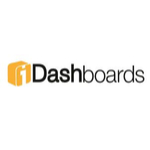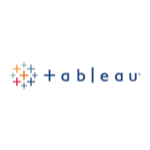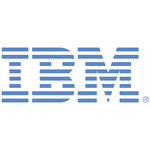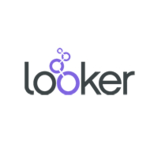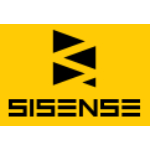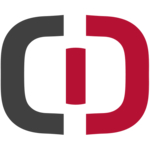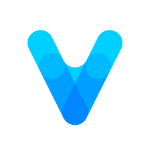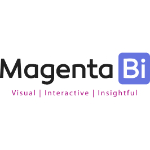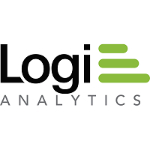TechnologyCounter provides genuine, unbiased real user reviews to help buyers make informed decisions. We may earn a referral fee when you purchase through our links, at no extra cost to you.
List of 15 Best Dashboard Software
Showing 1 - 15 of 30 productsiDashboards is a data visualization software that takes raw data and transforms it into visually appealing and interactive dashboards. With its user-friendly interface, iDashboards allows you to easily analyze and track your key metrics, making it a...Read iDashboards Reviews
the world of Tableau, a powerful data visualization software that allows you to analyze, explore, and share insights with ease. With its user-friendly interface features, Tableau simplifies the process of transforming data into meaningful visualizati...Read Tableau Reviews
IBM Cognos Analytics is a data analysis and reporting software designed to help businesses make informed decisions through its advanced analytics capabilities. With its user-friendly interface and customizable features, IBM Cognos Analytics is the go...Read IBM Cognos Analytics Reviews
Looker is a software designed to transform the way you analyze and visualize data. With its intuitive interface and powerful features, Looker is a tool for gaining valuable insights and making data-driven decisions. Get ready to elevate your analytic...Read Looker Reviews
Geckoboard is a business analytics platform that helps you visualize your data in real-time. From sales and marketing to finance and customer experience, our user-friendly dashboard allows you to monitor and track key metrics to make informed decisio...Read Geckoboard Reviews
Dundas BI is a business intelligence platform designed to help businesses of all sizes make data-driven decisions. With its intuitive user interface and customizable dashboards, Dundas BI makes it easy to analyze and visualize complex data, empowerin...Read Dundas BI Reviews
Sisense is a data analytics platform that empowers businesses to make data-driven decisions. Designed with user-friendliness in mind, Sisense allows companies to easily access, analyze, and visualize complex data. With its advanced technology and fle...Read Sisense Reviews
ClicData is a data analytics platform that empowers businesses of all sizes to make informed decisions. With its user-friendly interface and customizable dashboards, ClicData allows users to easily gather, analyze, and visualize data from various sou...Read ClicData Reviews
VobeSoft, a dynamic and versatile software designed to streamline your business operations. With its intuitive and user-friendly interface, VobeSoft empowers you to seamlessly manage tasks, projects, and data, while promoting collaboration and effici...Read VobeSoft Reviews
A1 Tracker is a software designed to revolutionize the world of project management. With its exceptional features and user-friendly interface, A1 Tracker streamlines the entire process, making it easier and more efficient for businesses of all sizes...Read A1 Tracker Reviews
NoBrokerHood is a platform that brings convenience, security, and community living together. Say goodbye to the hassles of traditional housing societies with NoBrokerHoods seamless technology that simplifies managing daily tasks, ensures safety, and...Read NoBrokerHood Reviews
MEAU is a solution for all your business needs! With its advanced features and user-friendly interface, MEAU streamlines operations, increases efficiency and boosts productivity. Say goodbye to tedious tasks and hello to seamless processes with MEAU...Read MEAU Reviews
datapine is a data analysis and visualization software designed to help businesses make data-driven decisions. With its user-friendly interface and robust features, datapine makes it easy for companies of all sizes to analyze and understand their dat...Read datapine Reviews
Magenta is a software designed to enhance your creative process and bring your ideas to life. With its powerful features and user-friendly interface, Magenta is a tool for artists, designers, and anyone looking to produce stunning visuals. Discover t...Read Magenta Reviews
Logi Analytics is a leading provider of self-service analytics and data visualization software that enables organizations to discover insights, make informed decisions, and drive business growth. With a focus on empowering users with intuitive tools...Read Logi Analytics Reviews
- What Is Dashboard Software?
- Top Reasons Why Businesses Need Dashboard Software?
- What Are the Top Key Features of Dashboard Software?
- What Are the Top Benefits of Dashboard Software?
- What Are the Steps to Choose the Right Dashboard Software?
- What Are the Types of Dashboard Software for Different Industries?
- What are the technology trends for best dashboard software?
- What Are the Deployment Options for Dashboard Software?
What Is Dashboard Software?
Dashboard software is classified as a form of business intelligence (BI) tool that facilitates the monitoring, analysis, and optimization of business processes for decision makers. A visual depiction of data, commonly displayed in dashboards accessible via computer or mobile devices, which offers graphical and interactive representations of an organization's performance.
Dashboard management system have the capacity to present visual representations of data in a manner that facilitates effortless observation, monitoring, and comprehension. In addition to other functionalities, online dashboard tools has the capability to present key performance indicators (KPIs), progress metrics, phonetext, and various other data.
Furthermore, the data can be disaggregated into distinct metrics accompanied by customisable variables and dates, so enabling the user to conduct a more comprehensive analysis and interpretation of their data.
For instance, the user has the ability to do a comparative analysis of sales across different regions or perform an examination of sales patterns throughout several months.
Dashboard software enables users to build comprehensive reports for efficient sharing of critical data with their team. In conclusion, the utilization of dashboard monitoring tools has the potential to enhance operational efficiency and facilitate data-driven decision-making within a company context.
Top Reasons Why Businesses Need Dashboard Software?
1. Increased Efficiency: Top dashboard tools that offers businesses the capability to perform real-time analysis and generate visual representations of data, enabling them to make informed decisions based on data. This software streamlines the tasks of data collection, organization, and evaluation, hence facilitating the decision-making process.
2. Making Better Decisions: The dashboard management tool serves as a valuable tool for assessing a company's performance, facilitating the identification of patterns and the detection of potential challenges.
3. Improved Performance: A dashboard serves as a centralized platform for aggregating and organizing data pertaining to various facets of corporate operations, such as sales, customer support, and marketing. Its primary objective is to facilitate the monitoring and enhancement of performance metrics.
4. Streamlined Communication: Dashboard software enables managers and executives to conveniently access and monitor intricate data from a unified platform, facilitating alignment and ensuring a shared understanding among all stakeholders.
5. Reduced Costs: The online dashboard tools are valuable for businesses as they facilitates time and cost savings through the automation of manual operations, hence obviating the necessity for expensive third-party services.
6. Enhanced Collaboration: Dashboard management tool facilitates collaboration among teams by integrating many sources of information.
7. Better Reporting: Dashboards give customers with immediate access to real-time insights pertaining to key performance indicators (KPIs), hence enabling firms to generate enhanced reports.
8. Improved Customer Experience: Organizations have the ability to acquire valuable knowledge regarding customer utilization of their products and services, enabling them to implement specific enhancements to optimize the overall customer experience.
9. Effective Use of Data: Dashboard monitoring tools facilitate the efficient acquisition, retention, and dissemination of data from various origins, thereby affording enterprises a holistic perspective of their paramount metrics.
10. Mobile Accessibility: A dashboard management system provides users with the capacity to conveniently access, distribute, and oversee data across several devices, hence enhancing the efficiency and effectiveness of both people and teams.
11. Experimental Analysis: Dashboards facilitate the rapid and effortless testing of assumptions by firms, hence enhancing their ability to effectively utilize data for making consequential business decisions.
12. Automation of Tasks: Dashboard software is designed to automate operations that are repetitive and tedious in nature, so allowing individuals to allocate their time towards more valuable and intellectually stimulating activities.
13. The utilization: The online dashboard tools enables users to efficiently get pertinent information by employing various functions such as data filtering, sorting, and comparison.
14. Personalized Views: The adaptability of dashboard management system enables enterprises to customize their dashboards according to the specific requirements and preferences of individual users, hence facilitating the provision of relevant data to each user.
15. Scalable Storage: Dashboard software provides businesses with the essential capability to accommodate a growing volume of data, hence facilitating the development of adaptable workflows and informed decision-making processes based on data analysis.
What Are the Top Key Features of Dashboard Software?
1. Customized Dashboards: Dashboard software enables users to personalize their dashboard experiences by presenting the data that holds the highest significance to them in a visually captivating format.
2. Automated Data Analysis & Updated Reports: The online dashboard tools enable users to efficiently examine data by automatically updating statistics and reports in accordance with predetermined criteria.
3. Data Visualization Capabilities: Many dashboard software solutions offer data visualization functionalities, including graphs, charts, maps, and other visual elements, to facilitate comprehensive reporting.
4. Data Aggregation: The dashboard management system enables users to aggregate data from various sources and integrate it into a cohesive and consolidated platform.
5. Segmentation & Filtering: Sophisticated dashboard monitoring tools provide users with the ability to segment and filter data, thus enhancing their decision-making capabilities.
6. Customizable Widgets and Alerts: The inclusion of widgets and customizable notifications within the dashboard facilitates users in maintaining current information regarding their data.
7. Colouring & Layouts: The utilization of color-coded images and flexible layout options facilitates the user's ability to effectively comprehend and evaluate the presented data.
8. Security & Accessibility: The majority of top dashboard tools provide customers with safe and extensive access to their dashboard data, facilitating convenient accessibility across various devices.
9. Real-time Insight: The best dashboard tools provide users with the ability to get real-time insights pertaining to their data, hence facilitating prompt and well-informed decision-making.
What Are the Top Benefits of Dashboard Software?
Dashboard software offers a variety of benefits, including:
1. Ease of access: The online dashboard tools facilitate convenient access to data from various sources, enabling users to conveniently consolidate and visualize their data inside a unified interface.
2. Time-saving: Dashboard software is a tool that presents data in a visual manner, enabling users to promptly discern patterns and irregularities within their data.
3. Insightful analytics: Dashboard management system offers users with important insights into their data, hence facilitating the process of making educated decisions.
4. Increased efficiency: Dashboard monitoring tools facilitate the optimization of job prioritization by enabling users to optimally leverage their data.
5. Customizable reporting: Dashboards facilitate enhanced job prioritization and efficiency by leveraging user data.
6. Streamlined collaboration: Top dashboard tools possess the capability to be disseminated throughout several teams, hence facilitating enhanced cooperation and the exchange of valuable insights.
7. Greater accuracy: The dashboard management tool plays a crucial role in detecting inconsistencies within data, thereby guaranteeing the precision and dependability of reporting.
What Are the Steps to Choose the Right Dashboard Software?
1. Identify your main goals and objectives: Identify the specific objectives that your firm aims to accomplish through the utilization of dashboard software. The user should contemplate the needed data to be displayed on the dashboard, as well as the necessary analytics and reporting functionalities.
2. Assess your data sources: This analysis aims to assess the data sources that will be utilized in the dashboard and devise strategies for their integration with the best dashboard tools.
3. Consider platform compatibility: Please verify the compatibility of the dashboard software with the existing platforms and technologies utilized by your organization.
4. Determine user requirements: Take into consideration the desired user experience that is intended to be established for users during their interaction with the dashboard monitoring tools.
5. Check for ease of deployment: Assess the anticipated duration for the deployment of the top dashboard tools, as well as the requisite training necessary for users to effectively utilize the product.
6. Look for scalability and upgradeability: It is imperative to ensure that the best dashboard tools possesses the capability to effectively scale in order to handle a burgeoning user base, while also being amenable to upgrades as the organization progresses and evolves.
7. Review security and support features: This inquiry seeks to ascertain the security measures and customer support functionalities offered by the dashboard monitoring tools, with the intention of providing reassurance and peace of mind to users.
8. Finalize a product choice: In conclusion, it is advisable to thoroughly evaluate the many product alternatives by conducting comprehensive research on customer evaluations, technical specifications, and pricing.
Choose the dashboard software that fulfills all of your specified parameters.
What Are the Types of Dashboard Software for Different Industries?
A wide range of dashboard software options are accessible across diverse sectors. Every sort of data visualization and reporting is designed to meet the distinct needs of different industries.
The most commonly used types of dashboard software are:
1. Business intelligence (BI): Offers an expanded array of analytical tools that enable organizations to effectively monitor and evaluate their operational effectiveness.
2. Key performance indicators (KPIs) and metrics: The utilization of performance indicators offers a valuable perspective on the operational effectiveness of a company, enabling a more comprehensive understanding of the efficacy or shortcomings of their initiatives in the present moment.
3. Enterprise resource planning (ERP): This paper offers a complete examination of a company's operational aspects related to data integration, encompassing several areas such as budgeting and customer service.
4. Automated reporting: The dashboard management tool enables organizations to establish customized reports as required, afterward delegating the responsibility of data collection and information dissemination to automated procedures.
5. Human resources management (HRM): Top dashboard tools offer empirically-based analysis of employee performance, prompt coaching, and gamification elements to inspire employees to achieve exceptional outcomes.
6. Health care: The company offers analytics solutions that prioritize the needs of patients, assisting healthcare professionals and hospital managers in making well-informed decisions within the realm of patient care.
7. Customer relationship management (CRM): Enables sales and marketing teams to remain updated on client profiles, activities, and preferences, hence enhancing customer interaction.
8. Website analytics: The system offers comprehensive real-time data on online visitors, enabling prompt responsiveness and adjustment to consumer requirements and preferences.
The selection of the best dashboard tools by a corporation is contingent upon its industry and specific requirements.
Nevertheless, it is important to note that many forms of dashboard software offer robust functionalities for data visualization, thereby facilitating organizations in making well-informed selections within a prompt timeframe.
What are the technology trends for best dashboard software?
1. Automation: Automation is considered to be a significant technological advancement within the realm of dashboard software. This functionality can facilitate tasks such as automated data source updates, simultaneous generation of charts from numerous sources, and notification of users on critical thresholds or emerging patterns that demand attention.
2. Mobile-friendly dashboard design: Given the ongoing evolution of mobile technology, it is imperative that the best dashboard tools be developed with a primary focus on mobile-first principles. This implies that a dashboard ought to offer a user-friendly interface when visited on a tablet or smartphone.
3. Cloud-based software solutions: Cloud-based software solutions offer an additional level of ease and scalability to enterprises. Cloud-based dashboard software offers convenient access from any device without the requirement of software installation or server infrastructure management.
4. Customizable analytics: The functionality of the best dashboard tools should facilitate the customization of analytics and reports to align with unique company demands or the requirements of the intended audience. Furthermore, it is imperative that the software provides users with the capability to efficiently and effortlessly exhibit, share, and engage in collaborative efforts pertaining to data.
5. Integration with enterprise systems: The seamless integration of dashboard software with enterprise systems is of paramount importance. This facilitates a more holistic assessment of a company's performance and optimizes the process of development and management.
What Are the Deployment Options for Dashboard Software?
The deployment options available for dashboard software are contingent upon the specific program being utilized. The available deployment methods vary depending on the platform and typically encompass cloud-based, on-premise, kiosk, and standalone versions.
In cloud-based deployments, the software is typically hosted by a third-party provider and can be accessed via a web browser. On-premise deployments refer to the hosting of software or applications by the user within their own datacenter or local network.
Kiosk deployments refer to the implementation of installations that enable a singular user experience by superseding the user's desktop environment. Standalone deployments refer to installations that are hosted on a local computer and exclusively utilized by a single user.
